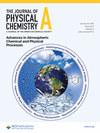Clarifying the Identity of the m/z 36 Ion in Water Microdroplet Mass Spectra.
IF 2.7
2区 化学
Q3 CHEMISTRY, PHYSICAL
The Journal of Physical Chemistry A
Pub Date : 2025-05-22
Epub Date: 2025-05-13
DOI:10.1021/acs.jpca.5c02557
引用次数: 0
Abstract
Several lines of evidence are presented that when ultrapure water is sprayed into air and the resulting water microdroplets are mass analyzed a peak at m/z 36 appears, which is identified as the water dimer cation. The water dimer cation, (H2O)2+•, and the hydrated ammonium cation, NH4+·H2O, have essentially indistinguishable mass differences in a low-resolution mass spectrum. By comparing the behavior of (H2O)2+• and NH4+·H2O with temperature and salt concentration, we can rule out the formation of NH4+·H2O in the spraying of ultrapure water into laboratory air.
澄清水微滴质谱中m/ z36离子的同一性。
提出了几条证据线,当超纯水喷射到空气中并对所产生的水微滴进行质量分析时,在m/z 36处出现一个峰,该峰被确定为水二聚体阳离子。水二聚体阳离子(H2O)2+•和水合铵离子(NH4+·H2O)在低分辨率质谱中具有本质上难以区分的质量差异。通过比较(H2O)2+•和NH4+·H2O的行为随温度和盐浓度的变化,可以排除超纯水喷洒到实验室空气中形成NH4+·H2O的可能性。
本文章由计算机程序翻译,如有差异,请以英文原文为准。
求助全文
约1分钟内获得全文
求助全文
来源期刊

The Journal of Physical Chemistry A
化学-物理:原子、分子和化学物理
CiteScore
5.20
自引率
10.30%
发文量
922
审稿时长
1.3 months
期刊介绍:
The Journal of Physical Chemistry A is devoted to reporting new and original experimental and theoretical basic research of interest to physical chemists, biophysical chemists, and chemical physicists.
 求助内容:
求助内容: 应助结果提醒方式:
应助结果提醒方式:


